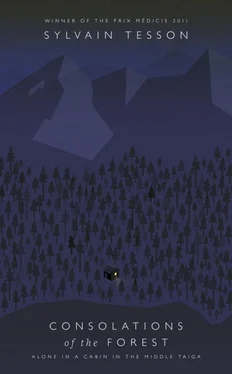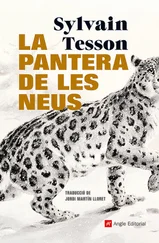In What Am I Doing Here? Bruce Chatwin quotes Jünger quoting Stendhal: ‘The art of civilization consists in combining the most delicate pleasures with the constant presence of danger.’ An observation that echoes Élysée’s injunction. The essential thing is to live one’s life with a brave hand on the tiller, swinging boldly between contrasting worlds. Balancing between danger and pleasure, the frigid Russian winter and the warmth of a stove. Never settling, always oscillating from one to the other extremity on the spectrum of sensations.
Life in the woods allows us to pay our debts. We breathe, eat fruit, pick flowers, we bathe in a river’s waters and then one day, we die without paying the bill to the planet. Life is sneaking a meal in a restaurant. The ideal would be to go through life like the Scandinavian troll who roams the moorland without leaving any tracks in the heather. Robert Baden-Powell’s advice should be made a universal principle: ‘When through with a campsite, take care to leave two things behind. Firstly: nothing. Secondly: your thanks.’ What is essential? Not to weigh too heavily on the surface of the globe. Shut inside his cube of logs, the hermit does not soil the Earth. From the threshold of his izba, he watches the seasons perform the dance of the eternal return. Possessing no machines, he keeps his body fit. Cut off from all communication, he deciphers the language of the trees. Released from the grip of television, he discovers that a window is more transparent than a TV screen. His cabin provides comfort and brightens up the lakeshore. One day, we tire of talking about ‘de-growth’ and the love of nature: we want to get our actions in sync with our ideas. It’s time to leave the city and close the curtains of the forest over speechifying.
The cabin, realm of simplification. Beneath the pines, life is reduced to vital gestures, and time spared from daily chores is spent in rest, contemplation, small pleasures. The array of tasks to be done has shrunk. Reading, drawing water, cutting wood, writing, pouring tea: such things become liturgies. In the city, each action takes place to the detriment of a thousand others. The forest draws together what the city disperses.
19 FEBRUARY
It’s evening, it’s nine o’clock, I’m at the window. A timid moon is out looking for a kindred spirit but the sky is empty. I who used to pounce on every second to make it surrender and give up its all – I am learning the art of contemplation. The best way to observe a monastic calm is to find oneself obliged to do so. To sit at the window drinking tea, allowing the land to ripple through its nuances, letting oneself steep in the passing hours, no longer thinking of anything, but suddenly seizing a passing idea and jotting it down in a notebook. The use of a window: to invite beauty in and let inspiration out.
I spend two hours in the position of Dr Gachet as painted by Van Gogh: gazing into space, cradling his cheek in his hand.
A rumbling arises abruptly in the silence and searchlights punch holes in the night. Through my binoculars I can see a small pack of four-wheel-drive vehicles heading north on the ice – and they’re coming my way. Twenty minutes later, eight 4×4s with ad posters on their flanks are lined up on my beach. Some notables have arrived from Irkutsk, members of Putin’s party, Edinaya Rossiya (United Russia), who are spending a week touring the lake. They’ll pass the night here in a tent. A few months later I’ll learn that among them are an FSB [2] The FSB has a long pedigree; here is a simplified genealogy. After the Russian Revolution swept away the secret police of Imperial Russia, Lenin created the Cheka, which in time became the GPU (part of the NKVD), and subsequently spun off to become the OGPU. The OGPU later moved back into the NKVD as the GUGB, moved out again into the NKGB, then back into the NKVD, finally separating out again into the NKGB only to wind up reassigned to the NKGB-MGB. Beria eventually combined the MGB and MVD into the MVD, but after Beria was purged, the MVD shed the secret police into the KGB. When the Soviet Union broke up in 1991, the KGB was dissolved and its functions distributed among the FSO, the SVR and its main successor agency, the FSB, whose personnel are informally referred to in Russia as ‘Chekists’ – which brings us full circle.
man, a few guys close to the governor, and the director of a nature reserve. Their tyres have broken up the snow embankment that led to the shore. The men don’t seem to have any respect for the powder snow. Walking on snow, that’s attacking the virginity of the world. You start with smashing in the white slopes and before you know it you’re disembowelling Poles.
The engines are running. The transistor radios blare out some Nadiya, a Lolita for pre-teen global villagers over whom the provincial nouveaux riches in Russia fawn like groupies. I’m devastated.
Shut tight inside my cabin, I try to soothe my nerves with half a pint of Kedrovaya vodka. I can hear those men whooping out on the ice, where they’ve cut a hole, set up a spotlight, and are taking turns plunging screaming into the frigid water. Which barely ranks as a first-class hazing in a barracks in Chechnya.
What I came here to escape has descended on my island: noise, ugliness, testosterone-fuelled herd behaviour. And I, poor fool, with my speeches about retrenchment and my copy of Rousseau’s Reveries on the table! I think about those Benedictine monks obliged to shepherd tourists around: religious recluses who thought to safeguard their faith in cloisters and who find themselves explaining the rules of their order to indifferent crowds.
In the fourth century, the Desert Fathers [3] Around the third century AD, hermits and ascetics began moving into the Nitrian Desert of Egypt, and these growing desert communities of monks and nuns became known collectively as the Desert Fathers. Saint Anthony the Hermit ( ca . 251–356), depicted in many a ‘Temptation of St Anthony’, is the most famous exemplar of this movement, which greatly influenced the development of Christianity and provided the model for Christian monasticism.
became crazed with solitude. Unable to bear even the slightest intrusion, they went deep into the sandy wastes, burying themselves in grottoes. The world they loved was cleansed of their fellow men. These days, sometimes a man just starts shooting at a bunch of kids hanging out in the estates. He gets a short paragraph in the newspapers and lands in a prison cell.
To cool my blood down, I go out on the lake while the Russians are skijoring , being pulled along on skis by their cars. I walk about a mile in the direction of Buryatia and stretch out on the ice. I’m lying on a liquid fossil 25 million years old. The stars overhead are a hundred times that. Me, I am thirty-seven and I’m calling it a day because it’s −30°F.
20 FEBRUARY
The men leave, the animals return.
What makes me happier this morning? The departure of that sad bunch of revellers at eight a.m. or the visit of a Siberian tit at my window a few minutes later?
I get out of bed so hung-over I’m almost upside-down. Yesterday I drank to forget. I feed the tit, light the stove. The cabin warms up quickly. I install the solar panels on the sawhorses I built yesterday. These panels will have it easy, lying there all day surrounded by beauty, gorging on photons.
Many reflections are born of the steam from my tea.
Sitting with my cup, I wonder about my little sister. Has she had her child yet? I can’t receive the slightest news: the computer imploded yesterday, done in by the extreme temperatures, and as for my satellite phone, it doesn’t pick up anything. Before I left Paris, I wasted precious hours gathering my technological equipment. I should have heeded the philosophy of Dersu Uzala, the Siberian hunter in Kurosawa’s eponymous film: the only things you can trust in the forest are an axe, a stove and a dagger. Without my computer, I have only thought. Well, memory is an electric impulse like any other.
Читать дальше












